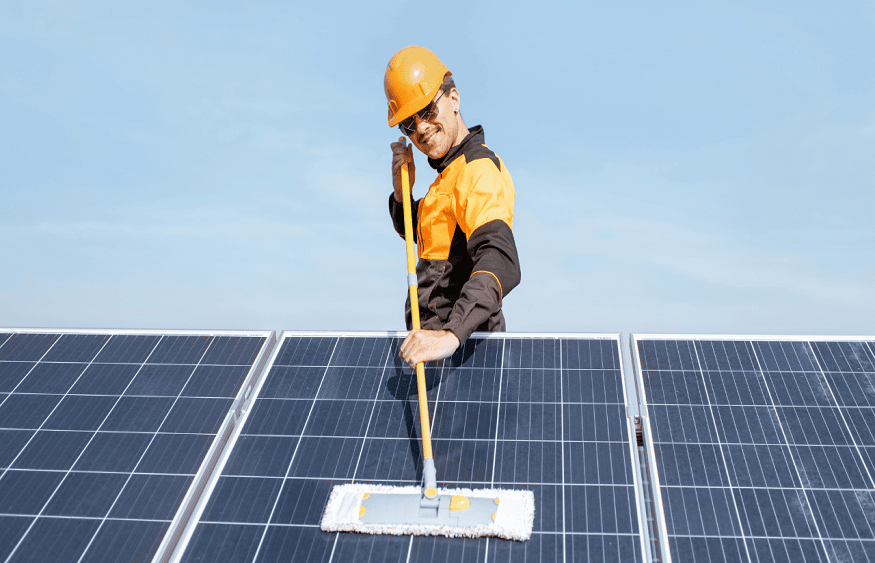Solar panels have become increasingly popular as a reliable and sustainable source of energy. While they require minimal maintenance compared to other energy systems, regular care and attention can significantly prolong their lifespan and ensure optimal performance. In this article, we will provide you with essential tips and tricks for solar panel maintenance that will help you maximize their efficiency and reap the long-term benefits of clean energy.
Keep the Panels Clean: Regular cleaning of your solar panels is crucial for maintaining their efficiency. Dust, dirt, bird droppings, and debris can accumulate on the surface, reducing the amount of sunlight that reaches the cells. To clean your panels effectively:
- Use a soft sponge or cloth and a mild, non-abrasive detergent mixed with water.
- Avoid using harsh chemicals, abrasive cleaners, or abrasive tools as they can damage the surface.
- Clean the panels early in the morning or late in the evening to prevent water from evaporating too quickly.
- Rinse thoroughly with clean water to remove any residue.
Inspect for Physical Damage: Perform routine visual inspections to identify any signs of physical damage to your solar panels. Look out for cracks, scratches, or other forms of damage that could affect their performance. If you notice any issues, contact a professional solar panel installer or manufacturer to assess the damage and provide appropriate repairs or replacements.
Monitor the Inverter: The inverter is an essential component of your solar panel system, as it converts the direct current (DC) generated by the panels into alternating current (AC) used in your home. Regularly check the inverter’s display or monitoring system for any error codes or abnormal readings. If you encounter any issues, consult a qualified electrician or your solar panel provider for assistance.
Trim Surrounding Vegetation: Over time, nearby trees or bushes may grow and cast shadows on your solar panels, reducing their output. It is important to trim any overhanging branches or vegetation that obstruct sunlight from reaching the panels. Regular trimming will ensure maximum exposure to sunlight, maximizing energy production.
Check for Loose Connections: Inspect the electrical connections between the solar panels, inverter, and your home’s electrical system. Look for loose or corroded connections, as they can impede the flow of electricity and affect the system’s efficiency. If you notice any loose connections, consult a professional electrician to address the issue promptly.
Monitor Energy Output: Keep track of your solar panel system’s energy output to ensure its performing optimally. Most solar inverters have monitoring capabilities that allow you to observe daily, monthly, and yearly energy production. By monitoring the output, you can quickly identify any significant drops in performance and address the underlying issues.
Check for Shade Issues: Even a small amount of shade on a solar panel can significantly impact its output. Regularly monitor your panels throughout the day to identify potential shade issues caused by new structures, trees, or nearby buildings. If you notice shading problems, consult with a solar expert to explore possible solutions such as panel repositioning or the use of micro-inverters.
Regular maintenance is essential for ensuring the longevity and optimal performance of your solar panel system. By following these tips and tricks, you can keep your panels clean, detect any physical damage or shading issues, and address electrical and connectivity concerns. With proper care, your solar panels will continue to generate clean and sustainable energy, contributing to a greener future while saving you money on your energy bills.
What are solar panels?
Solar panels, also known as photovoltaic (PV) panels, are devices that harness the power of sunlight and convert it into electricity. They are made up of multiple interconnected solar cells, typically made from silicon, which generates a direct current (DC) when exposed to sunlight. Solar panels come in various sizes and configurations, and they can be installed on rooftops, ground-mounted systems, or even integrated into building materials. These panels are designed to capture sunlight and convert it into usable energy, making them an environmentally friendly alternative to traditional fossil fuel-based electricity generation.
How do solar panels work?
Solar panels work based on the principle of the photovoltaic effect. Each solar cell within the panel consists of two layers of semiconductor material, typically silicon. The top layer is negatively charged, while the bottom layer is positively charged. When sunlight strikes the solar cells, photons from the sunlight knock electrons loose from their atoms, creating an electric current. The negatively charged electrons are captured and directed through an electrical circuit, generating a flow of electricity. This direct current is then converted into alternating current (AC) by an inverter, making it compatible with the electrical systems in homes and businesses. The AC electricity can then be used to power appliances, lights, and other electrical devices.
The pros and cons of a solar panel system:
Pros:
- Renewable and Sustainable: Solar energy is a clean and renewable source of power. It reduces reliance on fossil fuels and contributes to a greener and more sustainable future.
- Cost Savings: By generating your own electricity, you can reduce or even eliminate your monthly electricity bills, saving money in the long run.
- Environmental Benefits: Solar panels produce electricity without releasing harmful greenhouse gases or pollutants, reducing your carbon footprint and helping combat climate change.
- Energy Independence: Solar panels provide a degree of energy independence, as they generate electricity on-site, reducing reliance on the grid and potential energy price fluctuations.
- Government Incentives: Many governments offer incentives such as tax credits, grants, and feed-in tariffs to encourage the adoption of solar panels, making them a financially attractive option.
Cons:
- Initial Cost: The upfront cost of installing a solar panel system can be significant, although it has been decreasing over the years due to technological advancements and increased demand.
- Weather Dependence: Solar panels rely on sunlight to generate electricity, so their output can be affected by weather conditions. However, even on cloudy days, solar panels can still produce some electricity.
- Space Requirement: Depending on the size of the system, solar panels require ample space for installation, which may be a constraint for properties with limited rooftop or ground space.
- Maintenance: While solar panels require minimal maintenance, regular cleaning and occasional inspections are necessary to ensure optimal performance.
- Intermittent Generation: Solar panels only produce electricity during daylight hours, which means they do not generate power at night. However, battery storage systems can be used to store excess energy for use during non-sunny periods.
What is battery storage?
Battery storage is an additional component that can be integrated with a solar panel system. It allows the excess electricity generated by the solar panels to be stored for later use, typically during periods of low sunlight or at night. Battery storage systems consist of rechargeable batteries that store excess energy and release it when needed. This allows homeowners and businesses to maximize the utilization of their solar-generated electricity, further reducing reliance on the grid and increasing energy independence.
Would I benefit from Battery Storage?
The benefits of battery storage depend on various factors, including your energy consumption patterns, the cost of electricity in your area, and the availability of net metering or time-of-use billing. If you have high energy demands during non-sunny periods or experience frequent power outages, battery storage can provide a reliable backup power source and increase the self-consumption of solar energy. Battery storage also allows you to take advantage of time-of-use billing by storing electricity when rates are low and using it when rates are higher. However, it’s important to consider the additional cost of battery storage and evaluate whether the potential benefits outweigh the investment. – Looking for the best Solar Panels Marbella Spain has to offer? look no further.
What’s the cost of a solar panel system with and without battery storage?
The cost of a solar panel system can vary based on several factors, such as the size of the system, the type and quality of solar panels used, installation costs, and any additional equipment required. Generally, the cost is measured in euros (€) per watt of installed capacity. As of 2021, the average cost of a residential solar panel system in Europe ranged from €1.20 to €2.50 per watt, depending on the country and specific installation requirements.
Adding battery storage to a solar panel system will increase the overall cost. The cost of battery storage depends on the capacity and technology of the batteries used. On average, a residential battery storage system can range from €500 to €1,500 per kilowatt-hour (kWh) of storage capacity.
At Solares Energies, we specialise in delivering the pinnacle of solar technology and air conditioning systems in Marbella. Our high-grade solar panels are the embodiment of modern renewable energy solutions, enabling you to utilise Marbella’s generous sunlight in the most efficient manner. Every panel we offer is carefully designed to absorb the greatest possible amount of sunlight and convert it into a generous supply of green energy for either your domestic or commercial needs. This will dramatically cut your energy costs, shrink your carbon footprint, and contribute to a healthier planet.
Simultaneously, we offer top-of-the-line air conditioning systems, comprehending the necessity of reliable and energy-efficient cooling in Marbella’s warm climate. Our Air Conditioning Marbella Spain solutions are fashioned to afford premium comfort while conserving energy. Regardless of whether you need a compact unit for your residence or a powerful system for your workspace, Solares Energies stands ready to assist with premier products and exceptional customer care. Thanks to our profound knowledge and unwavering dedication to excellence, Solares Energies is the go-to provider for solar panels and air conditioning systems in Marbella.

